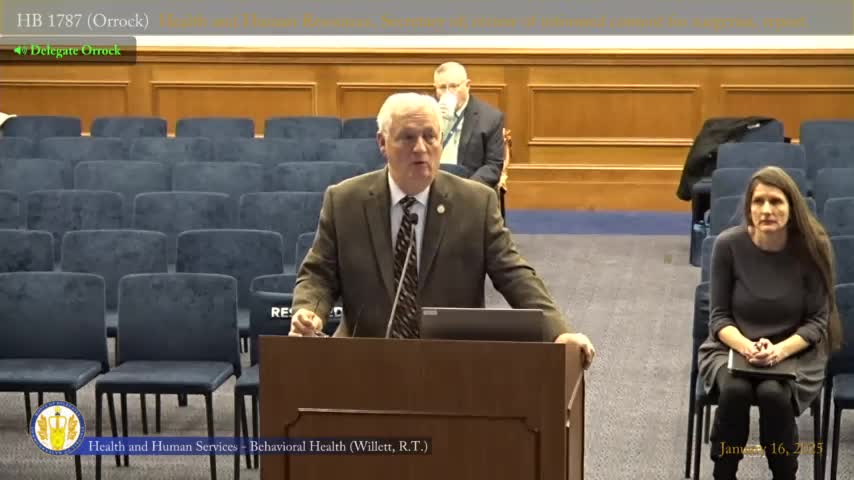After emotional testimony, subcommittee delays review bill for surgical consent forms
Get AI-powered insights, summaries, and transcripts
Subscribe
Summary
HB 1787 would require the Secretary of Health to review surgical informed‑consent forms at least every five years; the subcommittee took extended testimony, including a survivor's account, and voted to take the bill 'by for the day' to allow further drafting and discussion.
The House Health, Welfare and Institutions Subcommittee took testimony Friday on HB 1787, a bill to require the Secretary of Health to review surgical informed‑consent forms at least once every five years, but voted to take the measure ‘‘by for the day’’ to allow further work and off‑committee conversations.
Delegate Orrock, who presented the bill, said the proposal grew out of last year’s more narrowly focused measure and aims to standardize surgical consent forms across facilities and ensure they are updated as medical standards evolve.
Karen Collins, a witness who described herself as a patient injured by a surgical procedure, told the committee she consented to a diagnostic laparoscopy and possible appendectomy in 2018 but later learned her surgeon removed her only remaining functioning ovary without her informed consent. Collins said the removal rendered her sterile and induced menopause at age 37; the jury in her malpractice trial found for the doctor, she said, citing boilerplate language in the consent form that allowed additional procedures for ‘‘unforeseen conditions.’’ She said the issue is not isolated and referenced broader accounts and the recent Chesapeake case involving multiple victims.
Brent Rawlings of the Virginia Hospital and Healthcare Association said he was not aware of a regular, formal process at the Virginia Department of Health to review all informed‑consent forms used in hospitals and physician practices. He urged that the record‑level conversation between patient and provider remains critical and noted legal and accrediting standards already touch informed consent.
Committee members discussed whether the bill should remove or narrowly limit ‘‘catchall’’ consent language and whether the measure would be likely to survive gubernatorial review as drafted. The sponsor asked to continue working with members and stakeholders. The subcommittee agreed to take the bill by for the day and continue negotiations; no final action on content was taken at the hearing.
The committee also discussed definitions and threshold questions about what constitutes surgery and acknowledged the difficulty of finding a single fix for the legal and medical issues raised by witnesses.
